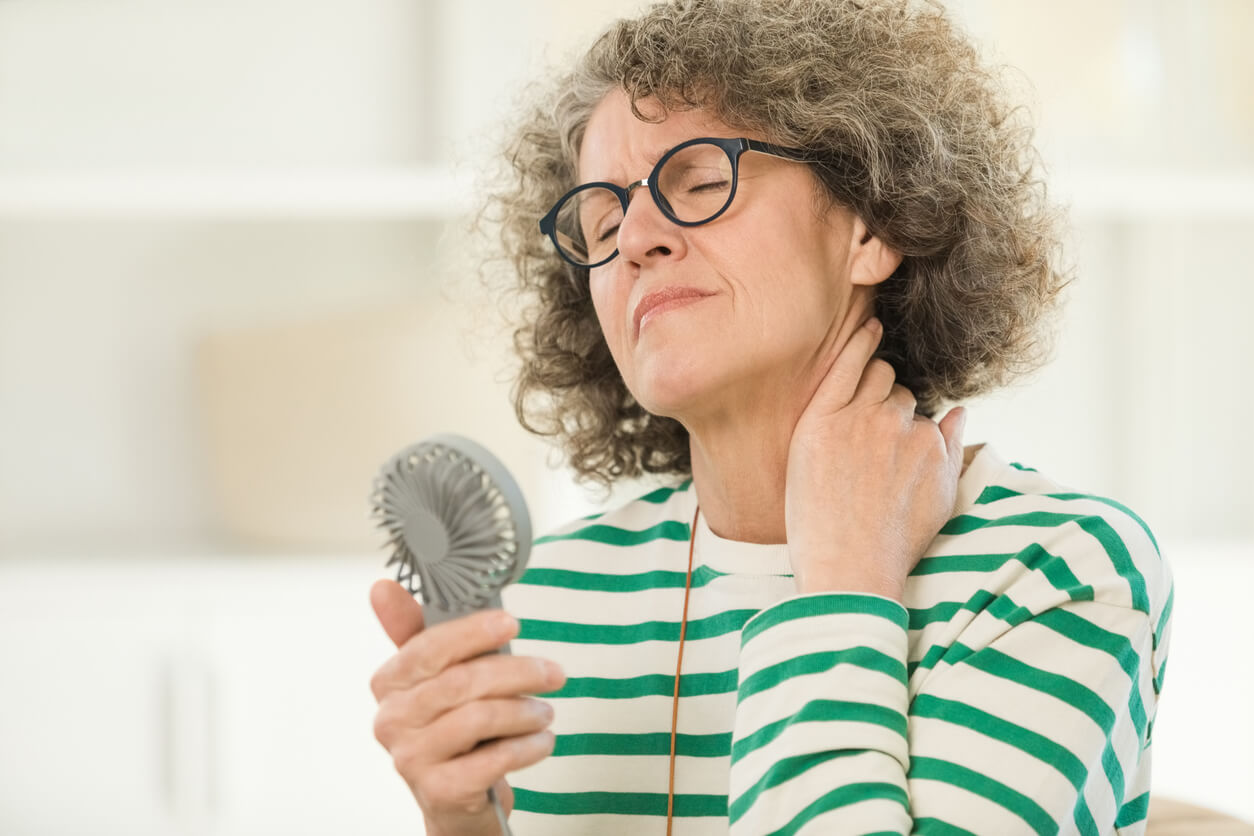
For many women, menopause can feel like crossing uncharted territory, with hot flashes as a common companion on this journey. Finding proper menopause treatment can also feel daunting to many women at this vulnerable time in their lives.
Hot flashes are sudden feelings of warmth, primarily affecting the face, neck, and chest. They are often accompanied by redness and sweating. These episodes can last anywhere from a few seconds to several minutes, and they can be quite uncomfortable or even distressing.
Managing hot flashes and navigating menopause treatment can be challenging, but with the right strategies and support, it is possible to find relief.
The Science Behind Hot Flashes
Menopause is a natural phase in a woman’s life that occurs as the body transitions out of its reproductive years. During this time, hormone levels fluctuate, leading to the symptoms typical of menopause, such as hot flashes. They can also occur in women undergoing certain medical treatments or after surgery that affects hormone levels.
The exact cause of hot flashes is still under investigation, but they are believed to be related to changes in the body’s thermoregulatory system. Declining estrogen levels affect the brain’s ability to regulate body temperature. This instability in temperature regulation leads to the sudden warmth characteristic of a hot flash.
Recognizing the Symptoms
It is important to recognize the characteristics of hot flashes, so you can know when to seek medical care:
Heat
Recognizing a hot flash is usually straightforward. A sudden wave of heat spreads through the upper body, often resulting in flushed skin and perspiration. This can be followed by a chill once the flash subsides.
Night Sweats
Hot flashes can occur at any time of day or night. When they happen during sleep, they are referred to as night sweats. These can disrupt sleep and lead to fatigue and irritability, impacting daily life significantly.
Emotional and Physical Impact
Hot flashes can cause more than just physical discomfort. They may also lead to emotional stress and anxiety, particularly when they occur in public or during important events. The unpredictability of hot flashes can make them a challenging aspect of menopause to manage.
Home Remedies for Comfort
If you have hot flashes, try these tips:
Dressing in Layers
This is one of the simplest ways to manage hot flashes. This approach allows you to easily adjust your clothing to accommodate sudden temperature changes. Opt for breathable fabrics, like cotton, to help keep you cool.
Staying Hydrated
Drinking plenty of water can help regulate body temperature and replace fluids lost through perspiration. Keeping a bottle of water nearby can be a quick and easy way to mitigate the intensity of a hot flash.
Mindful Eating
Certain foods and beverages can trigger hot flashes. Spicy foods, caffeinated drinks, and alcohol are common culprits. Keeping a food diary to track triggers can be helpful in reducing the frequency of hot flashes.
Professional Treatments
If home remedies are not working, talk to your provider about medical treatments, such as:
Hormone Replacement Therapy (HRT)
Hormone replacement therapy is a common treatment for managing menopause symptoms, including hot flashes. It involves taking medications that contain female hormones to replace the ones your body no longer produces. At Levin’s Women’s Health in Miami, tailored bioidentical hormone therapy is available to suit individual needs and symptoms.
Non-Hormonal Medications
For those unable or unwilling to take hormones, non-hormonal medications may provide relief. Selective serotonin reuptake inhibitors (SSRIs) and certain blood pressure medications have been found to reduce the frequency and severity of hot flashes.
Alternative Therapies
Acupuncture, yoga, and meditation are known to reduce stress, which may lower the frequency of hot flashes. However, it is advisable to consult with a healthcare provider before starting any new treatment plan.
Lifestyle Adjustments
Making some lifestyle adjustments, such as the ones listed below, may help reduce hot flashes.
Regular Exercise
Engaging in regular physical activity can help manage hot flashes and other menopause symptoms. Exercise improves mood and aids in weight management, both of which can help reduce the severity of hot flashes.
Stress Management
Stress and anxiety can exacerbate hot flashes. Techniques such as deep breathing, mindfulness, and relaxation exercises can be effective in managing stress.
Sleep Hygiene
Maintaining a regular sleep schedule and creating a comfortable sleeping environment can help manage night sweats and improve overall sleep quality. Consider using a fan or air conditioner to keep the bedroom cool.
The Role of Diet
Similar to lifestyle adjustments, making healthy changes to your diet may also help reduce hot flashes.
Incorporating Phytoestrogens
These are plant-derived compounds that mimic estrogen in the body. Incorporating foods like soy, flaxseeds, and chickpeas into your diet may help alleviate menopausal symptoms, including hot flashes.
Vitamin E and Omega-3
Some studies suggest that vitamin E and omega-3 fatty acids can reduce the frequency of hot flashes. Foods that are rich in these nutrients include nuts, seeds, and fatty fish, like salmon and mackerel.
Limiting Sugar and Processed Foods
A diet high in sugar and processed foods can lead to blood sugar spikes, which may trigger hot flashes. Focus on whole foods and a balanced diet to maintain stable blood sugar levels.
Menopause Treatment Near You in Miami, Florida
If hot flashes are impacting your quality of life, don’t hesitate to seek professional help. Regular visits to a gynecologist in Miami, Florida, can ensure that menopause symptoms, including hot flashes, are managed effectively. Levin’s Women’s Health offers comprehensive women’s health care and personalized treatment plans.
The team at Levin’s Women’s Health is committed to providing expert care and support for all stages of a woman’s life. For personalized advice and treatment options, schedule an appointment at Levin’s Women’s Health by calling (305) 981-0231. You may also use our online form to request your appointment. Our expertise and compassionate care can guide you through this transitional period of your life with confidence and comfort.
